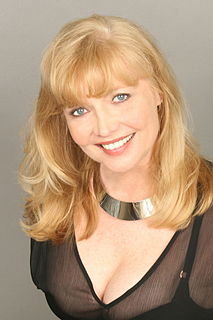A Quote by Kristine Kathryn Rusch
Our subconscious works in metaphors, stories, and word play. That's why a particular story or movie may mean more to some people than to others. Have you considered why you quest for this tale now?
Related Quotes
Nothing in this world is more powerful, or more dangerous, than the truth. That's why some people go to such lengths to avoid hearing it. It may also be why others strive so hard to keep their conversations empty. They wouldn't want to find themselves accidentally saying something meaningful that might bring about a change.
Poetry begins in trivial metaphors, pretty metaphors, "grace" metaphors, and goes on to the profoundest thinking that we have. Poetry provides the one permissible way of saying one thing and meaning another. People say, "Why don’t you say what you mean?" We never do that, do we, being all of us too much poets. We like to talk in parables and in hints and in indirections - whether from diffidence or some other instinct.
Plays are literature: the word, the idea. Film is much more like the form in which we dream - in action and images (Television is furniture). I think a great play can only be a play. It fits the stage better than it fits the screen. Some stories insist on being film, can't be contained on stage. In the end, all writing serves to answer the same question: Why are we alive? And the form the question takes - play, film, novel - is dictated, I suppose, by whether its story is driven by character or place.
While this may look loving, when we struggle with an idol of dependence, we’re in fact not loving people as much as we’re using them to fulfill our need to belong, be liked, and be desired. This explains why some friends and family members can be so demanding, smothering, and needy. It also explains why we’re so easily inflated by praise and deflated by criticism. It’s as if others have the ability to determine our identity for that day based on a word or even a glance
Why does it seem to be more and more challenging to find a perfect mate or maintain a happy and compatible relationship? Was love always this difficult? Haven't we heard stories of people being truly fulfilled and happy in love? Is love a myth? There are more people on the planet than ever before, and traveling the world has never been easier. Not only that; now we can use technologies like the Internet to connect with others. So what is the problem? Why does it seem to be more complicated than ever to meet the right person and live happily ever after?
We can tell people abstract rules of thumb which we have derived from prior experiences, but it is very difficult for other people to learn from these. We have difficulty remembering such abstractions, but we can more easily remember a good story. Stories give life to past experience. Stories make the events in memory memorable to others and to ourselves. This is one of the reasons why people like to tell stories.
Maybe instead of strings it's stories things are made of, an infinite number of tiny vibrating stories; once upon a time they all were part of one big giant superstory, except it got broken up into a jillion different pieces, that's why no story on its own makes any sense, and so what you have to do in a life is try and weave it back together, my story into your story, our stories into all the other people's we know, until you've got something that to God or whoever might look like a letter, or even a whole word.
Why do some people have to go barefoot so that others can drive luxury cars? Why are some people able to live only 35 years in order that others can live 70 years? Why do some people have to be miserably poor in order that others can be extravagantly rich? I speak for all the children in the world who don't even have a piece of bread.
This is not just a simple story of "money can't buy happiness." Or maybe that's just what it is. And if it is, why shouldn't it be? Because if this is something we are already supposed to know, then why don't we know it? Why do we chase and scrabble and fight for things to flaunt, why? Why do we reach for power over other people, and through the thin superiority of our possessions, believe we have it? Why do we let money make people bigger, and allow those without it to be made smaller? How did we lose the truth in the frantic, tribal drumbeat of more, more, more?






































